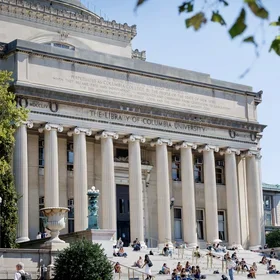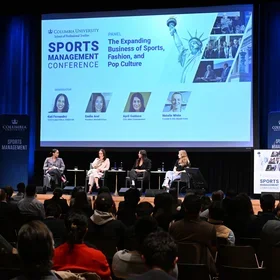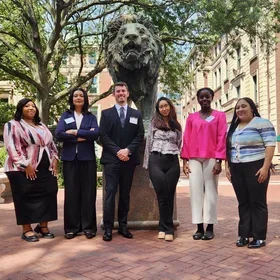For students who are still choosing which graduate program is right for them or for those in the midst of applying to a specific M.S. program, Columbia University admissions directors shared their top pieces of advice on applying to graduate school.
1. Ace the personal statement.
Robert Furno, the Dean of Admissions at the Graduate School of Arts and Sciences, likens a successful personal statement to a cocktail: “It’s one part 'what led you to where you’ve gotten,' and two parts 'what you want to do when you get here.' The best essays that we’ve received are those that can articulate what brought them to this stage,” said Furno.
Think of the personal statement as a way to add context to your GPA and test scores. Use this opportunity to frame your journey and share your vision of where you've been and where you're headed.
2. Choose references who know you best.
Whom a student chooses to write their letters of recommendation is as important as the content of the letters.
If a student is choosing between a higher-profile reference with little knowledge of the applicant versus a lesser-known recommender who knows the applicant better, admissions officers advise students to go with the reference who is more familiar with the applicant. It's more valuable to share a recommendation from someone with a more modest title who really knows your skills rather than someone with a grander title who cannot speak about the unique value of the prospective student.
In particular, Andie Hine, the Executive Director of Enrollment Management at SPS, also suggests that students familiarize their recommenders with the graduate program to which they're applying: “We see many recommendations where [the recommenders] have no idea what the program is.”
3. Show your engagement with the subject matter.
Prospective students often ask, “How important are academic performance and professional experience?” Though the answers range depending on the school and the graduate program, SPS generally seeks a balance of both. According to Hine, the overall objective of the application is for the prospective student to demonstrate their passion for the subject matter.
4. Don’t overvalue the GRE or GMAT.
All of the panelists agreed that test scores do not decide the fate of the applicant. Although the programs look for students who perform well academically, they do not judge one’s accomplishments solely through standardized testing.
“We don't weigh test scores as heavily as we weigh the personal statement and their work experience, demonstrated in their resumes and their recommendations,” Hine said of admissions at SPS.
5. Make a personal connection.
A personal email goes a long way. For those interested in a specific master's offering, consider reaching out to someone on the faculty in order to get information on the courses they teach and also demonstrate one's passion for the graduate program.
Hine said that making such a connection can help the admissions team better understand the applicant and their interests and intent.
6. Demonstrate your success.
"The trick is, great schools essentially don’t make people great," said Michael Robinson, the Senior Associate Director of Admissions at Columbia Business School. "They admit people who are on a glide path to success and they just make it easier."
Robinson said that students often speak about their potential success in their applications. He suggested not to do so. Rather, he said, applicants should show how they've already demonstrated their potential.
Learn more about the academic offerings at the School of Professional Studies at Columbia University.


